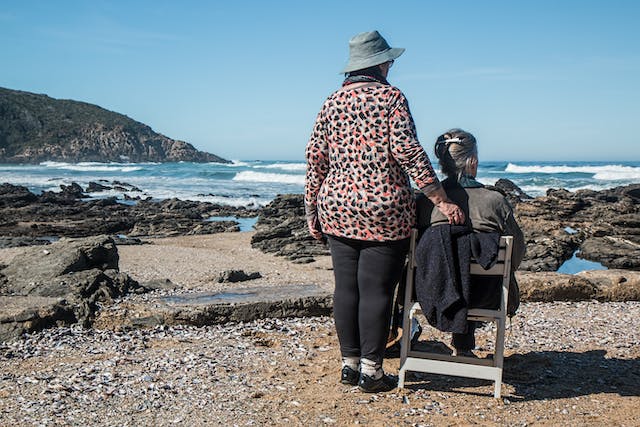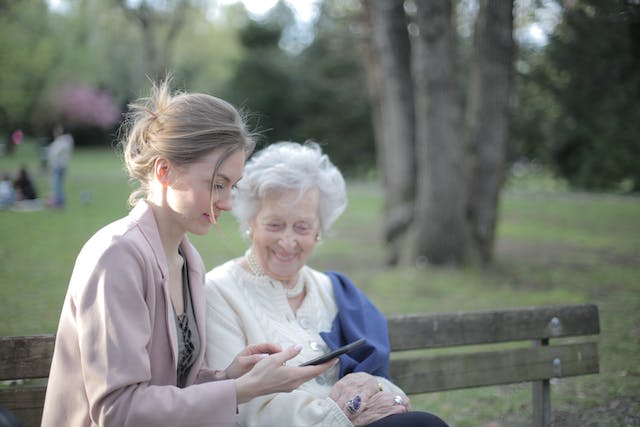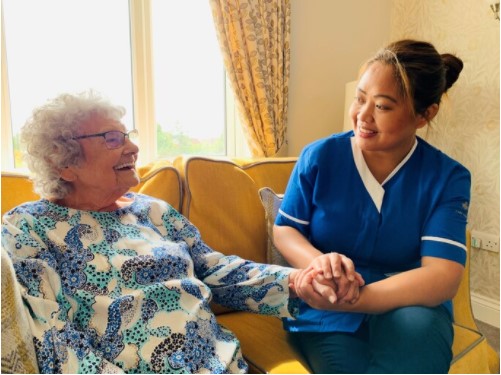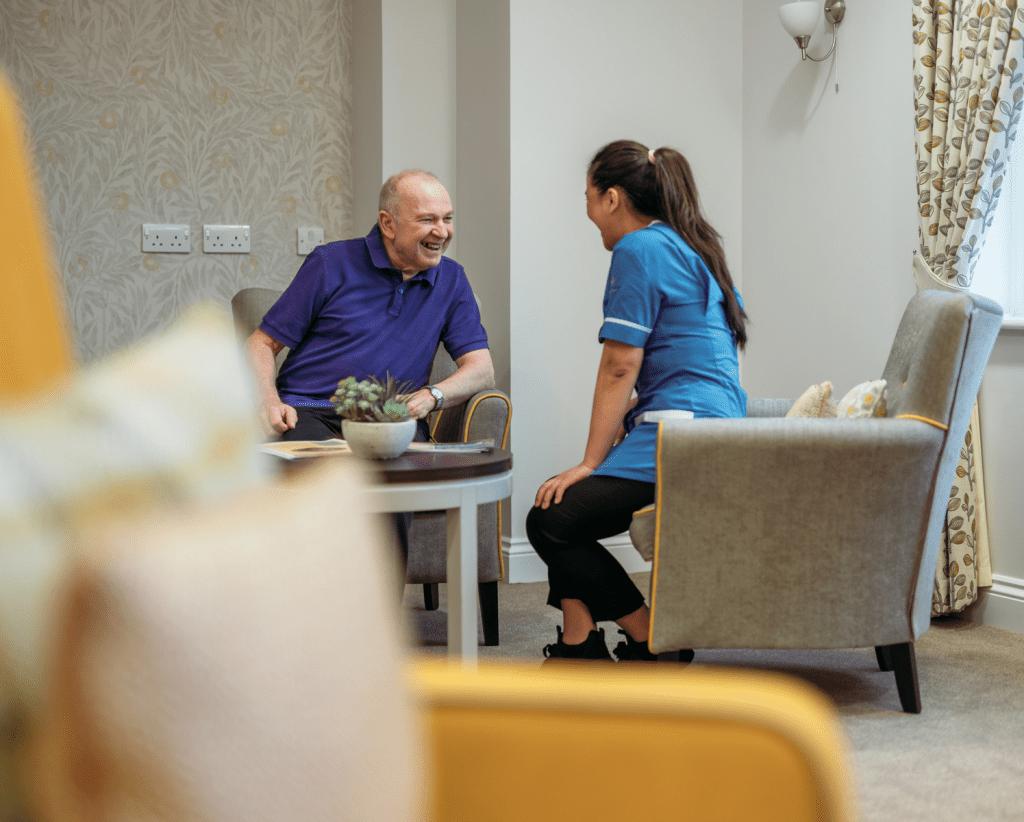What Is Holistic Nursing Care?

When considering nursing care, a common misconception is that care homes will only provide medical care services. It is important to find a care home that offers care services that encompass all of your loved ones' needs through holistic nursing care plans. In this blog, we explore what holistic nursing care is and how it enhances the quality of life for residents.
Holistic Care Meaning
Holistic care in nursing is essential, it addresses an individual's overall well-being in addition to their physical health. Holistic health care recognises that beyond someone's medical conditions they have social, emotional and spiritual well-being needs. The term ‘holistic care’ refers to providing healthcare which considers the entire individual. The concept of holistic care was first introduced by Florence Nightingale; the concept of empathetic and person-centred care enhanced patient satisfaction. From previous qualitative research, holistic care is known to maintain not only the body of an individual but also their soul.
Why Is Holistic Care in Nursing Important?
Those who practise holistic nursing care use a comprehensive approach, considering the individual's physical, emotional, social and spiritual well-being. Some of the key components have become very important and they involve:
Physical Care - A standard medical procedure and care such as providing medication, caring for wounds and handling other physical symptoms or illnesses.
Emotional Support - Emotional support is highly important for residents, offering a listening ear, respectful communication and a safe and welcoming environment for residents to share thoughts and worries.f
Psychological Care - This can include recognising and treating various mental health issues such as stress management, anxiety and sadness etc.
Spiritual Care - All nurses support and respect each individual's spiritual beliefs, providing the chance for spiritual expression through mediation and prayers.
Person-Centred Care Plans - While developing care plans values, preferences and goals are taken into consideration, by putting the resident first, their care is aligned with specific needs and requirements.
Nutrition & Lifecycle Guidance - It’s essential to give advice on diets, exercise and healthy life cycle choices to maintain and improve the individual's physical health alongside promoting preventive measures.



Differences Between Holistic Nursing And Traditional Nursing
The main difference between holistic nursing and traditional nursing is their approach to care…
Person-Centred Care - Holistic nursing care places a strong emphasis on person-centred care, recognising the individuality of each resident. Whereas traditional nursing considers patient care and preferences following nursing practice protocols, focusing more on treating specific medical conditions.
Whole-Person Approach - Holistic care in nursing sees everyone as whole beings, considering all aspects of their health. Traditional nursing care focuses on the physical aspects such as medication, motioning vital signs and treating physical ailments.
Integration of Complimentary Therapies - This holistic nursing practice can include relaxation techniques, herbal remedies, meditation and acupuncture. Traditional nursing prefers to use evidence-based medical and pharmaceutical treatments, along with theoretical knowledge.
Holistic Assessment - Holistic nursing administers a comprehensive assessment which goes beyond physical symptoms, exploring a resident's lifestyle, emotional state, spiritual aspects and relationships to get a deeper understanding of their well-being. Traditional nursing focuses on identifying physical symptoms, diagnosing medical conditions and conventional medicine.
Preventive & Wellness Focus - This is all about encouraging residents to adopt a healthier lifestyle, focusing on self-care and taking control of their well-being within holistic practices. Traditional nursing focuses on more chronic illnesses rather than preventative measures.
Collaborative & Interdisciplinary Care - Holistic nurses work closely with other healthcare professionals such as registered nurses to provide both comprehensive and integrated care. Traditional nursing also focuses on this collaboration but also has a more hierarchical structure with a prime focus on medical doctors.
It’s important to keep in mind that both a holistic approach and traditional nursing is necessary when it comes to the aspects of healthcare. Both approaches can complement one another and can be integrated based on the needs and requirements of the resident.
Benefits of Holistic Nursing Care For Residents
Holistic nursing care heals and supports the holistic principles of an individual's overall health and quality of life and by considering these needs, values and preferences of each person, holistic nursing makes sure that their care is tailored specifically to the individual to promote health. This is a personalised approach which fosters a sense of trust, engagement and empowerment within the healing process. Holistic nursing practices also aim to promote wellness whilst preventing illnesses, by focusing on preventive measures, self-care practices and lifestyle modifications; individuals experience improved health and quality of life. Additionally, these complementary activities and alternative therapies (meditation, nutrition counselling, relaxation techniques etc) can complement conventional medical treatment, enhancing well-being, reducing stress and supporting the body’s natural healing process.



How Does An Holistic Nursing Approach Help?
Nurses provide holistic care in different ways as it addresses their psychological, spiritual and physical needs. Here’s a breakdown of the advantages:
Psychological Well Being
Emotional Support - By addressing their emotional needs by providing empathetic and compassionate care, holistic nurses listen, validate feelings and create a safe place for one to express their feelings and worries.
Stress Reduction & Relaxation Techniques - Incorporating deep breathing exercises, meditation, mindfulness and guided imagery helps those control and manage their anxiety, therefore promoting relaxation.
Holistic Assessment & Medical Health Considerations - By identifying emotional distress, psychosocial stressors or mental health concerns holistic healthcare nurses can collaborate with other healthcare professionals, providing appropriate interventions and referrals to mental health services.
Spiritual Wellbeing
Meaning & Purpose - A holistic nurse can recognise the importance of spirituality, providing a supporting environment where those can express and explore their beliefs, finding meaning and purpose.
Spiritual Support - This can involve facilitating religious or spiritual rituals, and offering prayers or meditation sessions during times of existential questioning or spiritual distress.
Physical Well Being
Prevention & Wellness - By promoting preventative measures and wellness practices maintains and improves overall physical health, including education on healthy lifestyle choices, exercise recommendations, nutrition guidance and stress reduction techniques.
Integrated Approaches - These can support both physical healing and symptom management and can include alternative medicine such as acupuncture, herbal remedies, massage therapy and aromatherapy.
Pain & Management - By addressing the underlying causes of an individual's pain by using techniques like relaxation, guided imagery and non-pharmacological interventions can help alleviate discomfort.
Overall, holistic therapies and nursing provide a range of benefits which impact individuals positively, care environments an even nurses. By providing person-centred care, a comprehensive understanding that considers spiritual, physical and psychological dimensions, means improved and optimal health and well-being. It enhances healthcare settings, and residents' satisfaction, fostering a supportive care environment for many nurses and residents, cultivating stronger relationships, prioritising self-care and professional growth; reducing burnout and increasing overall job satisfaction. Holistic nursing is an evidence-based practice that plays a pivotal role in promoting holistic health, empowering individuals and creating an effective, compassionate healthcare system with comprehensive care.
Here at Ridgeway Rise Care Home, we provide a full range of care for those who need it, from residential and nursing care and dementia care to respite care and/or palliative care. Our approach is going above and beyond, putting the health and needs of our residents first, along with embracing the latest developments in caring practices and holistic nursing. You can be confident and rest assured that your loved one will receive the very best in terms of attention and care when benefiting from our luxurious, all inclusive care home, please do get in touch with us today if you’d like to learn more about our home or even book in for a tour; we'd be happy to help!





